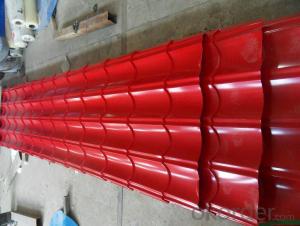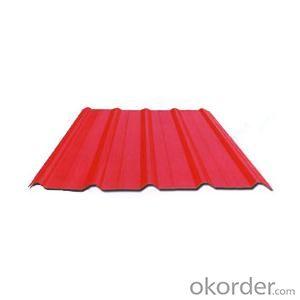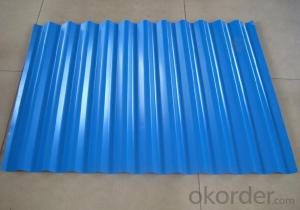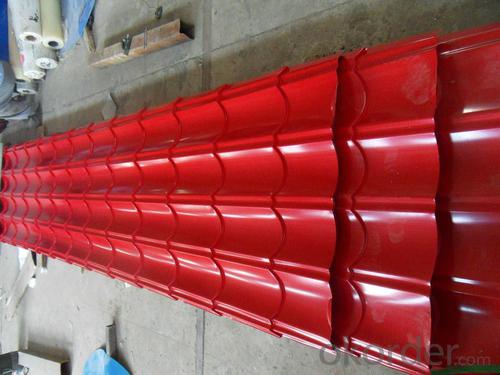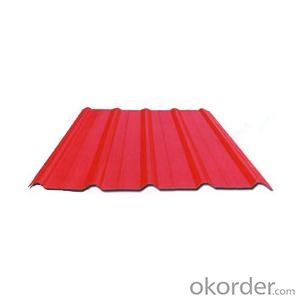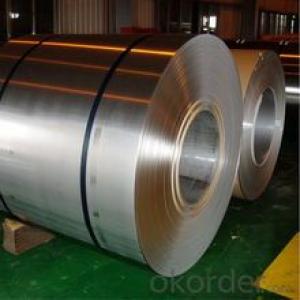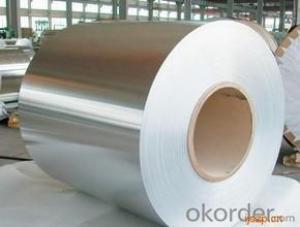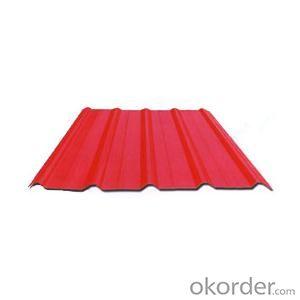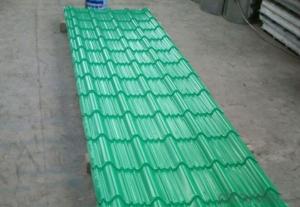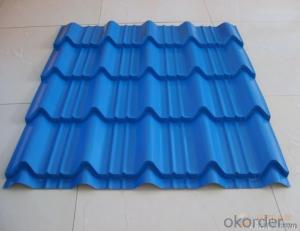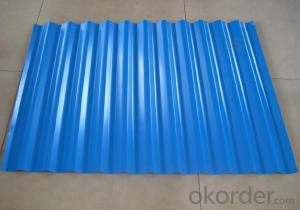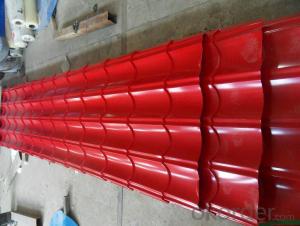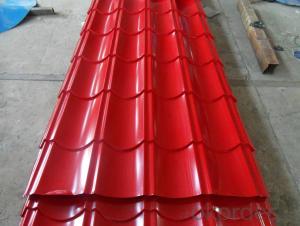Pre-Painted Galvanized/Aluzinc Steel Roof of High Quality with Different Width
- Loading Port:
- Shanghai
- Payment Terms:
- TT OR LC
- Min Order Qty:
- 50 m.t.
- Supply Capability:
- 10000 m.t./month
OKorder Service Pledge
OKorder Financial Service
You Might Also Like
1. Pre-Painted Galvanized/Aluzinc Steel Roof Description:
With GI as base material, after pretreatment (degrease and chemical treatment ) and liquid dope with several layers of color, then after firing and cooling, finally the plate steel is called pre-painted galvanized (aluzinc) steel. Pre-painted galvanized roof is good capable of decoration, molding, corrosion resistance. It generally displays superior workability, durability and weather resistance.
2.Main Features of the Pre-Painted Galvanized/Aluzinc Steel Roof:
• Excellent process capability
• Smooth and flat surface
• Workability, durability
• Excellent heat resistance performance
• High strength
• Good formability
• Good visual effect
3.Pre-Painted Galvanized/Aluzinc Steel Roof Images
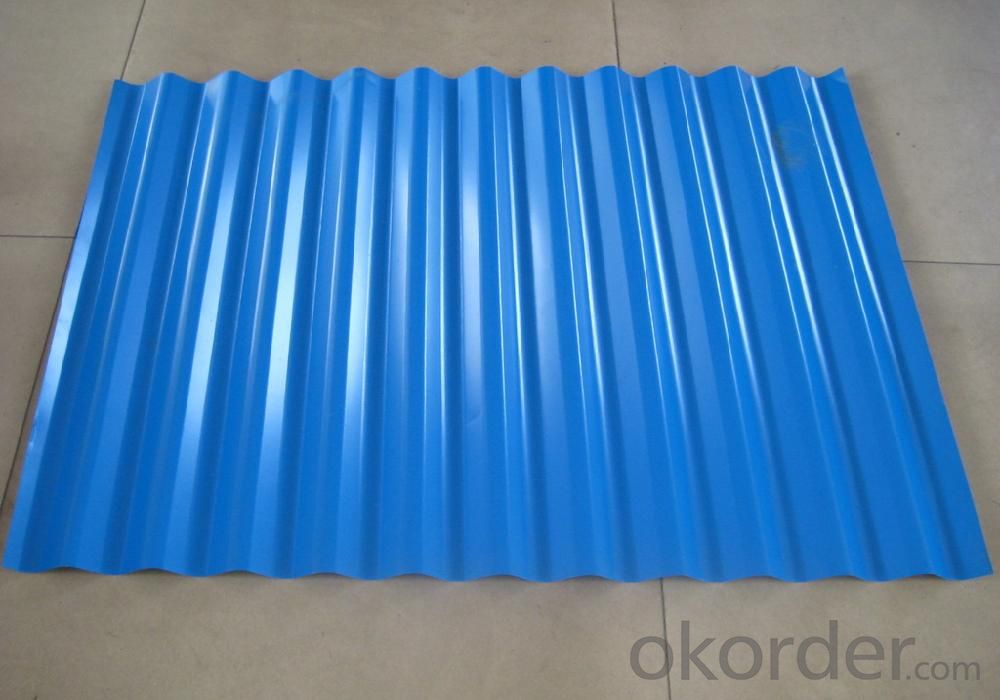
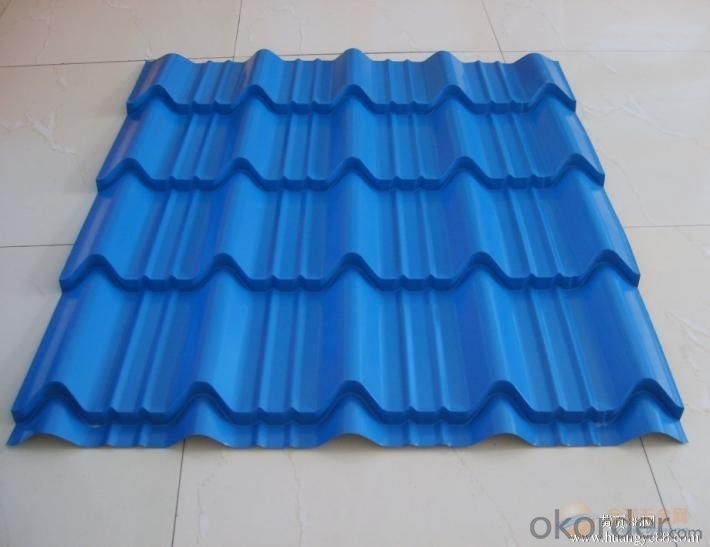
4.Pre-Painted Galvanized/Aluzinc Steel Roof Specification
Standard: AISI, ASTM, BS, DIN, GB, JIS
Grade: SGCC SGCH SGCD DX51D
Thickness: 0.13-3.0mm
Model Number: AISI, ASTM, BS, DIN, GB, JIS
Type: Steel Plate
Surface Treatment: Galvanized, anti-finger, with film
Application: Container Plate,panel sandwich
Special Use: High-strength Steel Plate,panel sandwich
Width: 30-1500mm
Length: any length
color: RAL color
5.FAQ of Pre-Painted Galvanized/Aluzinc Steel Roof
1.What’s the brand of the paint?
We use the best brand of all of the word—AKZO.
2.Which payment term we can do?
L/C at sight or T/T.
3.What’s the basic material of this product?
Galvanized/Aluzinc Steel
- Q: What are the main factors that affect the price of steel coils?
- The main factors that affect the price of steel coils include the cost of raw materials, such as iron ore and scrap metal, as well as the demand and supply dynamics in the market. Other influential factors include energy costs, transportation expenses, production capacity, and geopolitical factors that can impact global trade. Additionally, fluctuations in currency exchange rates and government regulations on trade and tariffs can also influence the price of steel coils.
- Q: How are steel coils welded together?
- Steel coils can be welded together using various methods, depending on the specific requirements and the type of steel being used. One common method is the use of electric resistance welding (ERW), where an electric current is passed through the steel coils to generate heat. This heat melts the edges of the coils, and pressure is applied to join them together. ERW is a quick and cost-effective method for welding steel coils. Another method is high-frequency induction welding (HFIW), which is commonly used for thinner steel coils. In this process, an induction coil is used to generate an alternating magnetic field, which induces an electric current in the steel coils. The resistance of the coils to this electric current generates heat, causing the edges to melt and form a weld. For thicker and heavier steel coils, submerged arc welding (SAW) is often employed. This method involves the use of a granular flux and a continuous electrode, which is fed into the weld area. The flux melts, creating a protective shield for the weld pool, and the electrode melts to form the weld. SAW is a robust and efficient method for welding steel coils. Additionally, laser welding and gas metal arc welding (GMAW) can also be used to weld steel coils. Laser welding offers high precision and speed, while GMAW, also known as MIG welding, uses an electric arc between a consumable wire electrode and the steel coils to create a weld. Regardless of the welding method used, the key factors for successful welding of steel coils are proper preparation of the edges, maintaining the appropriate heat and pressure levels, and ensuring the correct welding technique is employed.
- Q: I'm a Hobbyist and want to Build my own axial-flow jet engine,can I use steel as the Turbine blades instead of Titanium which I can't get easily?? What about the other parts I can use for...?!
- You can use steel but alloyed with a big percent of Mn and Cr. Titanium is very good but unfortunately it is expensive. On engines and Turbine blades it is indicate to use High Alloy metals that are resistant to fluage.
- Q: I'm doing a commercial for chemistry and I need to know any kind of chemistry dealing with Callaway Big Bertha Irons. I know they are stainless steel but any more info would help out! Thank you! :)
- Stainless steel is a mixture of metals, each metal is included in order to make up for each others weaknesses. Each metal is included due to a property that is benificial in some way, for instance Chromium is included because it makes the stainless steel 'stainless'. In chemistry a mixture of metals, stainless steel, is called an alloy.
- Q: Does anyone know what is 12 gage Cold Rolled Steel meaning? Also, help me to describe it.Thank you so muck ~!Mark Lin
- Steel thickness is measured by gages. 16 gage is approximately 1/16th of an inch. The larger the number (say, 24), the thinner the steel. Steel is made from large metal bars (4'x12', about 8 thick) that pass through presses to get thinner and thinner. If the final stages of rolling are done with pressure and not heat, it is cold rolled. It often gets galvanized to prevent rusting. Hope this helps.
- Q: What are the dimensions of steel coils used in automotive component manufacturing?
- The dimensions of steel coils used in automotive component manufacturing vary depending on the specific application and requirements. However, common dimensions include thicknesses ranging from 0.5mm to 3mm and widths ranging from 600mm to 2000mm.
- Q: I have heard of Cold Rolled steel, Castle Forged steel and Valerian steel and i was just wondering the difference between them.I know Valerian steel is by far the strongest and durable but what about the other two types? Do you know because i haven't read all the books yet.
- Castle Forged Steel
- Q: every time i look for steel over the internet like to build cars motorcycles ect i only get steel pipes where can i get steel sheets
- This okorder /... Most towns have a steel supply house/ business, check your yellow pages. Also check with local welding and machine shops. They can give you ideas and or their suppliers. They often have bits and pieces that you might buy, instead of ordering a full sheet of material. Wingman
- Q: How are steel coils used in the production of consumer goods?
- Steel coils are used in the production of consumer goods as they are processed and shaped into various components, such as sheets, tubes, and wires. These components are then utilized in manufacturing a wide range of products, including automobiles, appliances, furniture, and construction materials. The high strength and durability of steel make it an ideal material for consumer goods, ensuring their longevity and performance.
- Q: No. Not Stainless steel, I mean STEEL.Not a specific type, but STEEL.Thanks. xo
- Steel is mostly iron. However, it is an alloy or solid solution, or mixture of iron and other metals or sometimes carbon. All steel is a mixture. there are many varieties.
Send your message to us
Pre-Painted Galvanized/Aluzinc Steel Roof of High Quality with Different Width
- Loading Port:
- Shanghai
- Payment Terms:
- TT OR LC
- Min Order Qty:
- 50 m.t.
- Supply Capability:
- 10000 m.t./month
OKorder Service Pledge
OKorder Financial Service
Similar products
Hot products
Hot Searches
Related keywords
